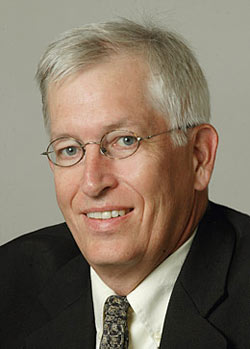Obituary
Jon Gjerde
05 November 2008
 Jon Gjerde (Peg Skorpinski photo)
Jon Gjerde (Peg Skorpinski photo)BERKELEY — Jon Gjerde, a leading historian of Scandinavian immigration to the Midwest and dean of social sciences in the College of Letters and Science, died of a heart attack on Sunday, Oct. 26, at his home in Albany. He was 55.
Gjerde’s untimely death stunned family, friends, and colleagues who knew him as a robust, athletic husband, father, scholar, and campus leader.
“It is hard to imagine how someone so young, vital, and giving could be snatched away so suddenly,” said George Breslauer, executive vice chancellor and provost, in a written announcement to campus colleagues about Gjerde’s death. “As a scholar, teacher, department chair, dean, and friend, Jon was everything one would hope for in a colleague. God, we will miss him.”
Gjerde rode his bicycle to campus from his Albany home each day, was a fan of Cal football and basketball, and had a gentle and quiet demeanor. “He was the quintessential Midwesterner ... a salt-of-the-earth kind of guy, unassuming in his Norwegian way,” said history professor John Efron, who shared Gjerde’s enthusiasm for sports.
During his 23 years on the Berkeley faculty, Gjerde wrote extensively about Scandinavian immigration to the United States in scholarly articles and five books, including Norwegians in Minnesota (2002); From Peasants to Farmers: The Migration from Balestand, Norway, to the Upper Middle West (1985), and The Minds of the West: The Ethnocultural Revolution of the Middle West, 1830-1917 (1997).
His scholarly paper “The Minds of the West” was ranked by Indiana University historian James Madison as being “among the very best studies of ethnicity we have.” Among other accolades, Gjerde won three Theodore Saloutos Memorial Book awards for his writings on immigration and agricultural history.
Born in Waterloo, Iowa, on Feb. 25, 1953, and raised in Cedar Falls, Gjerde was the youngest of Fern and Waldemar Gjerde’s three offspring. He was more than 15 years younger than his brother and sister. As a child, he played with his older sister’s son.
Waldemar Gjerde, a first-generation immigrant from Norway, taught at the University of Northern Iowa, where he developed audio-visual education. Fern was a grade-school teacher. Tragically, Waldemar died of a heart attack at 51, when Jon was only 4. “It was traumatic,” Jon Gjerde’s sister, Carole Gauger, recalled. She said their grandfather had also died young of a heart attack.
Fern raised her children by herself in the small university town. Academically, Jon was off the charts and feisty, but in an understated Midwestern way, Gauger said. As a 6-foot-plus-tall teenager, Gjerde played basketball in high school. He later attended the University of Northern Iowa, where he met his future wife, Ruth. In 1975, after he graduated with a bachelor’s degree in three fields — history, philosophy, and religion — the two were married in his mother’s living room. They went on to have two daughters.
After garnering a master’s degree and a Ph.D. from the University of Minnesota in 1978 and 1982, respectively, Gjerde took teaching positions there and at the University of Wisconsin and the California Institute of Technology. He landed a job as assistant professor of history at Berkeley in 1985.
History professor Jan De Vries, a former vice provost for academic affairs, said it was rewarding to watch Gjerde grow in his academic and leadership roles. “As someone who recruited him, and tried to persuade him to stay when he had opportunities elsewhere, it was a source of satisfaction for me to see Jon’s academic work acknowledged for its excellence and for the university community to visibly benefit from his sensible counsel and quiet leadership,” De Vries said.
After receiving tenure at Berkeley in 1989, Gjerde served as resident director of the UC Education Abroad Program’s Scandinavian Study Center in Lund, Sweden, from 1991 to 1992. “Even though he was a very cosmopolitan guy who traveled all over the world, he maintained a connection to small-town Midwestern culture,” said history professor David Hollinger, who was Gjerde’s colleague and friend.
Gjerde served as chair of Berkeley’s history department from 2001 to 2004, and assumed the role of interim dean of social sciences in 2006 after then-Dean Breslauer was named the campus’s executive vice chancellor and provost. In addition to becoming the Alexander F. and May T. Morrison Professor of History, Gjerde was formally named dean of social sciences in the College of Letters and Science last year.
Acutely aware of his family’s heart history, Gjerde was determined to beat his paternal genetic odds and get past age 51 by staying healthy through diet and exercise, his sister said.
Most recently, Gjerde was completing a book about Catholic-Protestant political and cultural interaction in 19th-century America and planning a trip with his wife to Vietnam. As a historian and a Democrat, he had been glued to the 2008 presidential race, said Gauger, adding her regrets that her brother did not live to see the outcome.
“He loved being married to Ruth, he loved being a dad, he loved his work, and he was a great brother,” Gauger said.
Gjerde is survived by his wife, Ruth; two daughters, Christine of Albany and Kari of Portland, Ore.; brother David Gjerde of Baltimore, Md; and sister Carole Gauger of Iowa City.
A private family service was held last week. Memorial contributions may be directed to the Jon and Ruth Gjerde Graduate Student Endowment, established last year to benefit the Department of History.
— Yasmin Anwar

